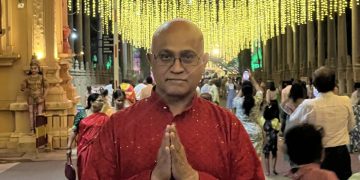ROAR for Guyana
Most of the objections to the federalist proposals have come from African-Guyanese. This is a remarkable position, since minorities across the globe from Assam to Zimbabwe have been clamouring for federalist principles to be instituted to protect their interests against actual or potential majorities. The reason is that in Guyana, Africans, literally do not see themselves as a “minority”. Their history of having slaved to build the foundations of the country, their dominant Creole values, their occupancy of the key state institutions, etc. have served to engender an entrenched belief of greater legitimacy to the national patrimony. The corollary, of course, until this belief is addressed, Africans will not concede legitimacy to a government perceived to be representative only of Indians. Federalism acknowledges the African right to a just share of their birthright.
Federalism and Partition
When the federalist proposals were first broached it was with a large measure of surprise the present writer noted that many Guyanese, saw it as a Trojan horse for “partition”. There may have been two reasons for this mistaken assumption. Firstly, back in the sixties, with the spectre of open ethnic conflict, Eusi Kwayana (then Sydney King) had proposed that the country be partitioned into three zones – one for Indians, one for Africans, and the third for all those who wanted to live together.
That this proposal may have been the minds of Guyanese forty years after its presentation leads to the second related, possible rationale. It is most likely that the ethnic conflict has proven so intractable for almost half a century that many Guyanese do not see any resolution and either desire partition or fear that the sentiment is so strong that given an inch with federalism, secessionist elements would quickly demand the “mile” of partition so as to get on with their lives.
Small populations not viable
It has been pointed out that that the populations of the proposed states may be too small to be viable. This criticism ignores the fact that right in Caricom there are a dozen full-fledged independent states that are doing much better than Guyana. It also looks at the population of Guyana as if it would be static, but if Guyana regains stability we can be sure that the population would rise. The original thirteen States of the US at the time of the union each had much smaller populations than today.
In 1999, Canada carved out a new territory- Nunavut – for its Inuits in the North who only number 25,000. Today, size is not as important as before in an integrated, globalised world where trade-bloc access guarantees markets. Improvement in technology creates efficiencies of production at increasingly smaller scales of production.
The State/regional governments would require too large a Bureaucracy
The argument on the need for extra layers of bureaucrats that would prove to be a financial burden goes to the need for bureaucratic efficiency and cost – potent arguments. However, the present Regional system duplicates many activities performed at the Federal level and vice versa. It presently has more workers than the proposed Federal system would need because of the streamlining effect of the clearer constitutionally enforced demarcation of responsibilities (exclusive competencies) that would be precipitated by the Federal reforms. The calls for simply more “devolution” would fail because of this barrier against interference by the Central Govt.
Guyana would be weakened to External threats
It has been suggested that a Federal Guyana would be weakened and become more vulnerable to external threats. This allegation is related to the accusation that federalism would lead to a break-up of the Guyanese state. As has been emphasised, Guyana will remain a sovereign state and the Federal Government having less to do may perform better at the duties left at that level such as Defence and External Affairs. The Army would be a federal institution that would be deployed primarily at our borders from where our major external threats will come.
Citizens would have to move or be restricted in their movements
Since Guyana would remain as a single country, all citizens would be free to move throughout the country in an unhampered manner. While States/Regions may set residency requirements for certain benefits, they would not be able to prohibit any Guyanese citizen from moving into a state or settling there.




































































